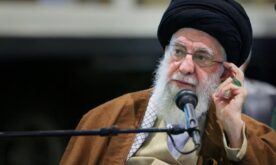RFL/RE – As Iran heads to the polls on March 1, there is a common thread running through many messages from ordinary Iranians.
The elections will usher in a new parliament and Assembly of Experts, a body that picks the country’s supreme leader.
But in dozens of audio and written messages sent to RFE/RL’s Radio Farda from inside Iran, many people said they will not vote in what they said will be “meaningless” elections that are likely to consolidate the power of the country’s hard-liners.
The sample — although small — underscores the challenge to the legitimacy of Iran’s ruling clerical establishment, amid rising anti-regime sentiment seen most vividly in the unprecedented street protests that rocked the country in 2022.
“You are not people’s representatives,” an Iranian man said in an audio message. “You want people only for their votes and nothing else. Then you want nothing to do with the people and they are cast aside.”
Another man urged people not to vote for a “corrupt regime that has no place in ancient and civilized Iran.”
“Isn’t it time to say no to executions, dictatorship, and the occupation of my homeland, Iran?” added the man in an audio message sent to Radio Farda.

The authorities in Iran do not tolerate any form of dissent and have jailed scores of reporters, activists, and lawyers in recent years.
Around 700 prisoners were executed in Iran in 2023, alone, including nine protesters, according to human rights groups.
During the state’s brutal crackdown on the months of nationwide protests that erupted in September 2022, at least 500 protesters were killed and thousands were arrested.
The protests began as a rebuke against the brutal enforcement of the hijab, a key pillar of the Islamic republic. But they soon snowballed into one of the most sustained demonstrations against Iran’s theocracy, with some protesters calling for an end to clerical rule.SEE ALSO:Iran’s Clerical Rulers Face ‘Legitimacy Crisis’ Ahead Of Elections
“Today we see that whoever criticizes the clerical dictatorship…is killed, injured, tortured, or imprisoned,” said another man in an audio message sent to Radio Farda.
Those who sent audio and written messages to Radio Farda from inside Iran did not reveal their names or locations for fear of retribution.
Calls For Boycott
Scores of prominent Iranians outside the country and political and civil activists in Iran have called for a boycott of the March 1 voting.
Almost 300 political, social, and cultural figures in Iran on February 25 publicly denounced the upcoming vote, calling for people to follow suit and not participate in the “engineered” and “staged” balloting.SEE ALSO:Scores Of Prominent Iranians Call For Boycott Of ‘Staged’ Elections
A day earlier, imprisoned Iranian human rights lawyer and Nobel Peace Prize winner Narges Mohammadi urged a boycott alongside “national sanctions and global condemnation” of the elections, calling the moves “a political necessity and a moral duty.”
Iranian officials and state-run media have accused those calling for a boycott of doing the “enemy’s” bidding.
Officials have repeatedly called on eligible voters to cast their ballots in the elections, calling it a religious duty.
The calls have come amid fears of a repeat of the record-low turnouts in the 2020 parliamentary elections and the 2021 presidential vote. Given the widening gulf between the ruling clerics and Iran’s young population as well as ongoing state repression and economic mismanagement, the authorities are bracing for another poor turnout, according to experts.
“The elections are meaningless,” said a man in another audio message sent to Radio Farda, in reference to what is seen as the grossly unfair playing field in elections in Iran, where candidates are vetted by a hard-line body whose members are directly or indirectly chosen by the supreme leader.
“Taking part in the elections, even if we’re indifferent toward all the crimes that have been committed [by the state] in recent years, would only be a mockery of ourselves,” the man added.
In another audio message, a man said he “hoped people’s patience has run out” and they will not take part in the elections.
This is the only way, he said, to “end this miserable, sad, and poverty-stricken life.”
 Shabtabnews In this dark night, I have lost my way – Arise from a corner, oh you the star of guidance.
Shabtabnews In this dark night, I have lost my way – Arise from a corner, oh you the star of guidance.



